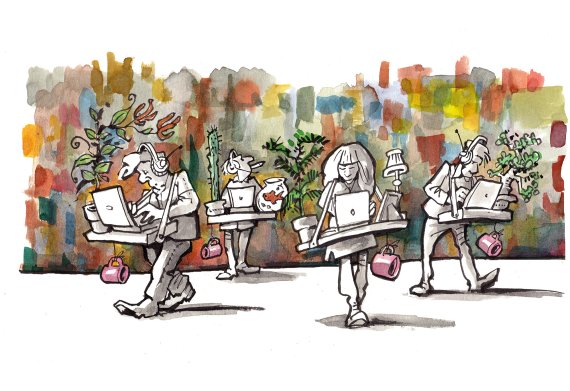Would you rather work in a small office or a spacious open plan one? The WUR Council posed this question on the intranet. More than 600 staff responded. Most of them want a desk they can make their own, and preferably in a small room.
Linda Bakker

Research assistant at Applied Bioinformatics
‘There are three of us sharing a room in Radix, and I’m very happy with that. We all work part-time, so you are on your own sometimes. I couldn’t stand working on the other side of the building in one of those open plan offices. I don’t like noise, chatter and movement around me. And everyone can listen in when you are on the phone, or discussing your work. I don’t think that’s very good for the privacy of the person on the phone, or those around them. They say open plan offices improve communication, but an awful lot of flex workers sit with their headphones on in a world of their own. My colleagues have different views on the open plan office, but it’s not my cup of tea.’
Linda Veldhuizen
PhD student at Plant Production Systems

‘I understand the logic of hot desking. People are in the field a lot, in meetings, or having a mummy or daddy day, which means a lot of empty work stations. Then you opt for hot desking. The question is, who has to be flexible. In our group nearly every member of staff has a permanent desk, and the MSc students who are working on their thesis can find themselves a hot desk every morning. So they are the hot-deskers in our workplace. I don’t know how they find that, but it wouldn’t work for me. I’m a creature of habit and I like to have a familiar place with the same colleagues. The thing I find hardest about open plan offices is that you can so easily disturb each other with short consultations and phone calls. So then you need a lot of meeting rooms, large and small. Radix is full, whereas the groups are growing, so this is a growing problem. You miss the small interactions. We don’t talk to each other if there are more than three people in our eight-person office, whereas those kinds of moments are really important for enjoying your work.’
Jorick Bruins
PhD student at Organic Chemistry

‘I work in Helix in a room with three other PhD students. It’s important to me to have my own desk where I can keep my papers, notebooks and lab journals. I would find it annoying to have to keep on arranging everything on my desk all over again. Four of us sharing a room, all with our own desks, is perfect for me. We are in the same research field, so we can ask each other things. That helped me a lot at the start. I worked in Nijmegen for a while too, in an open plan office, but I did have my own desk. That was fine; you learn to cope with the noise.’
Inge Buitink
Communication adviser at Facilities & Services

‘I have a hot desk in a large open space in Actio, and I enjoy working like that. I would hate to go back to being cooped up in a tiny office. We have lots of different options. You can choose to work at a block of four or six desks, there are desks next to each other with partitions between them, you can withdraw into a focus room, and for long conversations and phone calls you go into a meeting room, sit at the social table or phone box. The nice thing is: in an open space like this it is easier to consult each other quickly and you get to know much more about each other’s work. It helps that that we have clear agreements, which we also evaluate regularly. For example, you are asked to take your laptop and other things with you to any meeting that lasts longer than 30 minutes, so after that you have to find another work station. That’s fine by me: it means you keep getting to know other colleagues. I have also seen very noisy open offices where there are a lot of distractions, but this one is spacious and pleasant.’
There is no room for personal expression in the open plan office
Leanne Westerink
Education coordinator at Marketing and Consumer Behaviour

‘I’ve been working at Wageningen University since September. I share a room with just one colleague and that’s fine. In my previous job I first worked in a room with three to four colleagues, and we had a kitchenette and a sitting area too. That was great, but then we had to move to an open office. That meant we couldn’t have lunch together anymore, and there was much less interaction. Communication became more superficial and things went wrong. I also found the open plan office soul-destroying, because no one had their own desk so you couldn’t put anything personal on your desk. You have no influence on your environment, and I don’t like that at all. So I’d rather have a small desk of my own than more space in an impersonal open office.’
Sietse Sterrenburg

Study adviser at the Social Sciences group
‘I’m attached to my own work station where I can hang up pictures of the children, for instance. Now I share a room with another study adviser. I enjoy that, and it creates practical challenges, because we have a lot of meetings with students. At the moment we often plan those meetings so that we don’t have them at the same time, and for meetings about personal issues we also need private rooms. That can be tricky on busy days. For me it would be ideal to have a shared office with several small meeting rooms nearby. I have worked in open plan offices as well. I can do that too, but it requires a different way of working. You must have all your work on your laptop and you can’t arrange your own work space. One problem is that a lot of people have to work in open plan offices against their will. I think each department should make its own plans to use the available space in a way that suits the users.’

 Illustration Henk van Ruitenbeek
Illustration Henk van Ruitenbeek 

